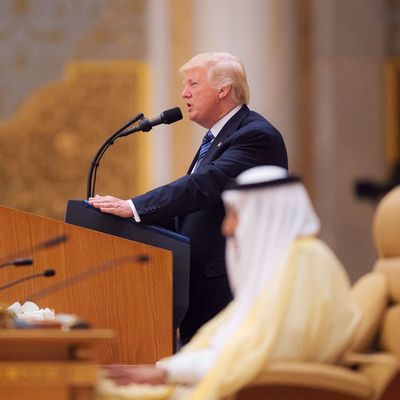
When we learned Donald Trump was going to give a “major speech” on Islam in Saudi Arabia—penned by career Islamophobe Stephen Miller, no less—there were reasons to fear the president might cause a major international scandal, either by insulting his hosts or by perpetuating the American habit of explaining other people’s religions to them.
Now that Trump has delivered his speech, the latter concern remains. But as it turns out his hosts were probably delighted by his words (much as they might snicker at its presumptuousness), since Trump’s whole take was to identify with the Saudi regime’s belief that it perfectly represents “true” Islam, as opposed to, well, the entire Shia tradition, and those unruly Sunni insurgencies that threaten the stability Riyadh most values.
As Peter Beinart noted, Trump’s speech fell well short of Obama’s famous and much-derided (especially by Trump) 2009 Cairo address when it came to speaking truth to power:
Trump criticized terrorist groups like ISIS for their “persecution of Jews,” and he condemned Iran for pledging “the destruction of Israel.” But since ISIS and Iran are Riyadh’s most bitter foes, those condemnations won’t have bothered the Saudi monarchs at all. Unlike Obama, Trump avoided the broader problem of anti-Semitism and Holocaust denial in Islamic countries, a problem in which his Saudi hosts are deeply complicit. Nor did he even hint at the fact that Saudi Arabia still does not recognize Israel.
On the question of women’s rights, it was much the same. Trump attacked jihadist terrorists for “the oppression of women.” But he described King Salman’s government as a virtual beacon of women’s rights. “Saudi Arabia’s Vision for 2030 is an important and encouraging statement of tolerance, respect, empowering women, and economic development,” Trump declared. You would never have known that women in the Kingdom still can’t drive.
Beinart attributes this kowtowing to the Saudis to Trump’s chronic inability to repeat nasty things he has said about people to their face. “Trump is a coward,” he says. But there is a another, less psychological explanation: that Trump’s speech represents an accommodation of his domestic political attacks on “radical Islamic terrorism” to a foreign policy focused on opposing Iran and ISIS at every turn.
By any reasonable standard, from its founding Saudi Arabia has always been and remains the chief exporter and financier of “radical Islam,” in the sense of subsidizing massive missionary activity aimed at promoting the rigid, quasi-totalitarian Wahhabi sect. As a New York Times report on Saudi influence last year put it:
There is a broad consensus that the Saudi ideological juggernaut has disrupted local Islamic traditions in dozens of countries — the result of lavish spending on religious outreach for half a century, estimated in the tens of billions of dollars. The result has been amplified by guest workers, many from South Asia, who spend years in Saudi Arabia and bring Saudi ways home with them. In many countries, Wahhabist preaching has encouraged a harshly judgmental religion, contributing to majority support in some polls in Egypt, Pakistan and other countries for stoning for adultery and execution for anyone trying to leave Islam.
But it’s also clear that the Saudi regime wants to combat all sorts of politically inconvenient fallout from the rapid spread of the very brand of exclusivist Sunni Islam it and its associated charities and foundations try to replicate around the world. So in practice what you have is an effort to distinguish “radical Islam” from “terrorism.” The ultimate product is the Orwellian idea of a Riyadh-based “Global Center For Combating Extremist Ideology,” which Trump helped open over the weekend. With all due respect to the Saudi regime’s authentic (if sometimes ambivalent or even double-dealing) hostility towards terrorist activity, this is a bit like opening a democracy think-tank in Moscow—which for all we know could be a Trump project down the road.
In any event, being able to pretend that Saudi Arabia is not only innocent of complicity in “radical Islamic terrorism”—a contention Donald Trump repeatedly rejected before becoming president —but is America’s chief ally in fighting it will square a lot of circles for the Trump administration. He may get some blowback from conservative evangelical clergy upset at this obvious whitewashing of Wahhabism. But insofar as there aren’t a whole lot of Saudis becoming refugees to Europe and the United States, Trump’s less theologically inclined supporters might have no problem with the president’s new buddies, particularly if he continues to be uninhibited in his attacks on Iranians and ISIS and the “threat” posed by refugees from the Syrian hellscape. We can only imagine what the Saudis will say to each other about this blatantly non-religious man after he has moved on to other stops in his “Abrahamic faiths” tour of 2017.






























